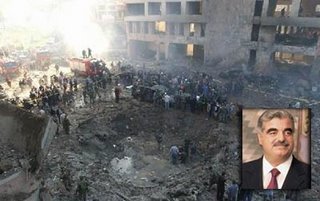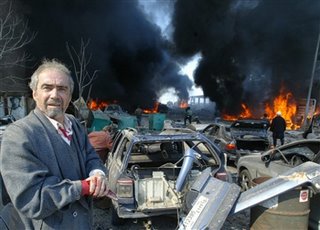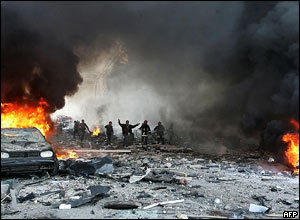 If the administration cannot fabricate a "crisis" over nuclear weapons in Iran (which fired off some missiles today) or North Korea (against which the UN has agreed on sactions) in time to subvert the upcoming midterm "elections", they may still be able to get what they want by way of Lebanon. Or at least it appears that they are doing their best to set up a contingency plan.
If the administration cannot fabricate a "crisis" over nuclear weapons in Iran (which fired off some missiles today) or North Korea (against which the UN has agreed on sactions) in time to subvert the upcoming midterm "elections", they may still be able to get what they want by way of Lebanon. Or at least it appears that they are doing their best to set up a contingency plan.According to Wednesday's New York Times,
The White House said [November 1st] that there was “mounting evidence” that Iran and Syria are involved in a plot to overthrow the government of Prime Minister Fouad Siniora of Lebanon, but senior officials refused to describe in any detail the intelligence they said they had collected.They won't describe the so-called intelligence in any detail, because then all the details could be checked and it would be easy to determine whether or not they were telling the truth.
At the moment, given the information available, I'd say they are probably lying.
To be honest, I would say that even given no information at all, just based on their track record. But in this case I have even more reasons to suspect what they are saying.
Here is some of what they are saying:
American officials who were pressed today about the assertion on Lebanon said they had evidence that Syria and Iran were trying to engineer the creation of a new “unity” government that they could control, partly through the Lebanese militant group Hezbollah.Note how the NYT conveniently forgets to mention that the "Lebanese militant group" just happens to be a significant part of the current Lebanese government.
One senior American official, who did not want to be identified because he was discussing an intelligence issue, said there were also indications of “planning for a more violent” attack on the government, but he gave no details.... who did not want to be identified because he was lying?
I'm just asking.
One method of lying is by exaggeration:
In the White House statement, issued by President Bush’s press secretary, Tony Snow, the administration said there were “indications” that Syria was trying to block passage of a statute by the Lebanese Parliament that would cooperate with an international tribunal being put together to try those accused of involvement in the assassination of former Prime Minister Rafik Hariri. In a warning to Syria, the statement said the tribunal would be established “no matter what happens in Lebanon.”
 Trying to block the passage of a statute is not the same as trying to overthrow a democratically elected government, and so far we don't even have any proof that Syria has been trying to block the passage of a statute. All we have on this is a quote from an anonymous source who shouldn't have been talking about intelligence matters in the first place (unless he was trying to provide a pretext for another pre-emptive war), and now the word of a well-known serial liar.
Trying to block the passage of a statute is not the same as trying to overthrow a democratically elected government, and so far we don't even have any proof that Syria has been trying to block the passage of a statute. All we have on this is a quote from an anonymous source who shouldn't have been talking about intelligence matters in the first place (unless he was trying to provide a pretext for another pre-emptive war), and now the word of a well-known serial liar.As for those accused of involvement in the assassination of former Prime Minister Rafik Hariri, they are almost certainly innocent, unless the contemporaneous news accounts of the assassination-by-bombing were wildly inaccurate.
As you can see from the photos, the bomb that killed Rafik Hariri was dozens of times more powerful than bombs used by garden-variety terrorists, and Hariri was vehemently anti-American (although this fact was omitted from virtually every news report that appeared at the time).
Syrian intelligence officials, including close family members of President Bashar al-Assad, have been implicated in the attack. Syria has denied being involved in the attack in February 2005 ...One problem with the idea that Syria was behind the attack concerns motive. Why would Syria want to remove a powerful anti-American presence from the Lebanese political scene?
In fact, what country would be most interested in removing a powerful anti-American presence? Hmmm... I'll give you a moment to think about that one.
In interviews in recent days, senior American officials have alluded less directly to concerns about Syrian and Iranian interference in Lebanon’s affairs. They have suggested that the concerns are one reason that the United States could not engage in negotiations with Syria or Iran, as several leading Republicans, including former Secretary of State James A. Baker III, have urged.Clearly, if senior American officials were truly concerned with interference in Lebanon's affairs, they should have been talking to Israel. Or were we supposed to forget what Israel did to Lebanon this summer?

I suppose we were. And it appears as if the USA is preparing to do the same thing to Syria.
“Talking isn’t a strategy,” the president’s national security adviser, Stephen J. Hadley, said in an interview late last week, before he headed to Iraq. “The issue is how can we condition the environment [so] that Iran and Syria will make a 180-degree turn,” he said.We all know how the United States can condition the environment. That's what worries me.